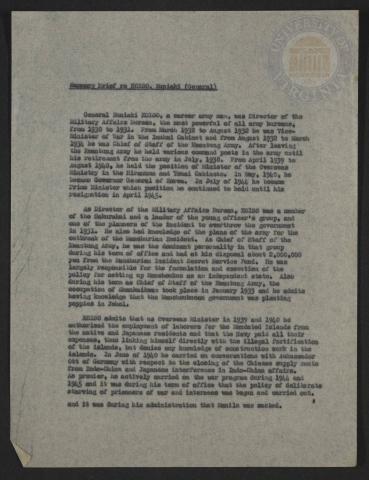
Page 1
| Parent | Summary Brief about Kuniaki Koiso |
|---|---|
| Date | |
| Language | English |
| Collection | Roy L. Morgan Papers |
| Box | Box 3 |
| Folder | 1946 [IMFTE] (IPS) Translations of interrogations. |
| Repository | University of Virginia Law Library |
Summary Brief re KOISO, Kuniaki (General)
General Kuniaki KOISO, a career army man, was Director of the Military Affairs Bureau, the most powerful of all army bureaus, from 1930 to 1931. From March 1932 to August 1932 he was Vice-Minister of War in the Inukai Cabinet and from August 1932 to March 1934 he was Chief of Staff of the Kwantung Army. After leaving the Kwantung Army he held various command posts in the army until his retirement from the army in July, 1938. From April 1939 to August 1940, he held the position of Minister of the Overseas Ministry in the Hiranuma and Yonai Cabinets. In May, 1940, he became Governor General of Korea. In July of 1944 he became Prime Minister which position he continued to hold until his resignation in April 1945.
As Director of the Military Affairs Bureau, KOISO was a member of the Sakurakai and a leader of the young officer’s group, and one of the planners of the incident to overthrow the government in 1931. He also had knowledge of the plans of the army for the outbreak of the Manchurian Incident. As Chief of Staff of the Kwantung Army, he was the dominant personality in that group during his term of office and had a t his disposal about 2,000,000 yen from the Manchurian Incident Secret Service Fund. He was largely responsible for the formulation and execution of the policy for setting up Manchoukuo as an independent state. Also during his term as Chief of Staff of the Kwantung Army, the occupation of Shankaikwan took place in January 1933 and he admits having knowledge that the Manchoukuan government was planting poppies in Jehol.
KOISO admits that as Overseas Minister in 1939 and 1940 he authorized the employment of laborers for the Mandated Islands from the native and Japanese residents and that the Navy paid all their expenses, thus linking himself directly with the illegal fortification of the islands, but denies a knowledge of construction work in the islands. In June of 1940 he carried on conversations with Ambassador Ott of Germany with respect to the closing of the Chinese supply route from Indo-China and Japanese interference in Indo-China affairs. As premier, he actively carried on the war program during 1944 and 1945 and it was during his term of office that the policy of deliberate starving of prisoners or war and internees was begun and carried out. And it was during his administration that Manila was sacked.
